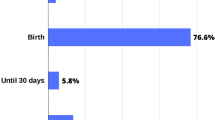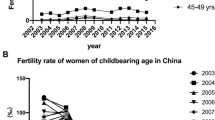Abstract
Down syndrome (DS) is the most common genetic disease at birth; on average, it affects 1 in 700 newborns. The syndrome features cognitive impairment, susceptibility to certain diseases, and (in some cases) congenital malformations. Improvements in medical care for people with DS have led to an increase in life expectancy. Furthermore, the systematic provision of specific support during childhood improves cognitive function and autonomy in adulthood. Consequently, patients and their families are now seeking the same rights as healthy people. Access to procreation is an emerging debate. The presumption of infertility in DS is based on a few old studies. Down syndrome appears to cause spermatogenesis defects in men and premature menopause in women. When assisted reproductive technology makes it possible to solve these problems, the question of fertility in DS must be addressed. Without entering into highly controversial ethical considerations related to parenthood for people with DS, we reviewed the literature on fertility in DS and tried to specify the associated genetic risk.
Similar content being viewed by others
References
Delabar JM, Theophile D, Rahmani Z, Chettouh Z, Blouin JL, Prieur M, et al. Molecular mapping of twenty-four features of Down syndrome on chromosome 21. Eur J Hum Genet. 1993;1:114–24.
Canfield MA, Honein MA, Yuskiv N, Xing J, Mai CT, Collins JS, et al. National estimates and race/ethnic-specific variation of selected birth defects in the United States, 1999–2001. Birth Defects Res A Clin Mol Teratol. 2006;76:747–56.
Allen EG, Freeman SB, Druschel C, Hobbs CA, O’Leary LA, Romitti PA, et al. Maternal age and risk for trisomy 21 assessed by the origin of chromosome nondisjunction: a report from the Atlanta and National down Syndrome Projects. Hum Genet. 2009;125:41–52.
Gil MM, Accurti V, Santacruz B, Plana MN, Nicolaides KH. Analysis of cell-free DNA in maternal blood in screening for aneuploidies: updated meta-analysis. Ultrasound Obstet Gynecol. 2017 Sep;50(3):302–14. https://doi.org/10.1002/uog.17484.
Frid C., Drott P., Lundell B., Rasmussen F., Annerén G. Mortality in Down’s syndrome in relation to congenital malformations. J Intellect Disabil Res. 1999 Jun;43 ( Pt 3):234–41.
Zigman WB, Lott IT. Alzheimer’s disease in Down syndrome: neurobiology and risk. MRDD Res Rev. 2007;13:237–46.
Esbensen AJ. Health conditions associated with aging and end of life of adults with down syndrome. Int Rev Res Ment Retard. 2010;39:107–26.
Koran ME, Hohman TJ, Edwards CM, Vega JN, Pryweller JR, Slosky LE, et al. Differences in age-related effects on brain volume in Down syndrome as compared to Williams syndrome and typical development. J Neurodev Disord. 2014;6:8.
Seidl R, Bidmon B, Bajo M, Yoo BC, Cairns N, LaCasse EC, et al. Evidence for apoptosis in the fetal Down syndrome brain. J Child Neurol. 2001;16:438–42.
Stagni F, Giacomini A, Emili M, Guidi S, Bartesaghi R. Neurogenesis impairment: an early developmental defect in Down syndrome. Free Radic Biol Med. 2018;114:15–32.
Wisniewski KE, et al. Down syndrome children often have brain with maturation delay, retardation of growth, and cortical dysgenesis. Am J Med Genet. 1990;Suppl. 7:274–81.
Wiseman FK, Al-Janabi T, Hardy J, Karmiloff-Smith A, Nizetic D, Tybulewicz VL, et al. A genetic cause of Alzheimer disease: mechanistic insights from Down syndrome. Nat Rev Neurosci. 2015;16:564–74.
Smith DS. Health care management of adults with down syndrome. Am Fam Physician. 2001;64(6):1031–8.
Skotko BG, Levine SP, Goldstein R. Self-perceptions from people with Down syndrome. Am J Med Genet A. 2011;155A(10):2360–9.
Sloper P, Cunningham C, Turner S, Knussen C. Factors related to the academic attainments of children with Down’s syndrome. Br J Educ Psychol. 1990;60:284–98.
Morch W-T, Skar J, Andersgard AB. Mentally retarded persons as parents: prevalence and the situation of their children. Scand J Psychol. 1997;38:343–8.
Carfi A, Antocicco M, Brandi V, et al. Characteristics of adults with Down syndrome: prevalence of age-related conditions. Front Med (Lausanne). 2014;1:51.
Sheridan R, Llerena J Jr, Matkins S, Debenham P, Cawood A, Bobrow M. Fertility in a male with trisomy 21. J Med Genet. 1989;26:294–8.
Zuhlke C, et al. Down syndrome and male fertility: PCR derived fingerprinting, serological and andrological investigations. Clin Genet. 1994;46:324–6.
Pradhan M, Dalal A, Khan F, Agrawal S. Fertilty in men with Down syndrome: a case report. Fertil Steril. 2006;86:1765.e1–3.
Campbell WA, Lowther J, McKenzie I, Price WH. Serum gonadotrophins in Down’s syndrome. J Med Genet. 1982;19:98–9.
Grinspon R, et al. Early onset of primary hypogonadism revealed by serum anti Mullerian hormone determination during infancy and childhood in trisomy 21. Int J Androl. 2011;34:e487–98 ISSN 0105Z6263.
Hsiang G. et al. Gonadal function in patients with Down syndrome. Am J Med Genet. 1987 Jun;27(2):449–58.
Stearns PE, Droulard KE, Sahhar FH. Studies bearing on fertility of male and female mongoloids. Am J Ment Defic. 1961;65:37–41.
Johannisson R, Gropp A, Winking H, Coerdt W, Rehder H, Schwinger E. Down’s syndrome in the male. Reproductive pathology and meiotic studies. Hum Genet. 1983;63(2):132–8.
Kjessler B, de la Chapelle A. Meiosis and spermatogenesis in two post-pubertal males with Down’s syndrome: 47,XY,G+. Clin Genet. 1971;2:50–7.
Liu Y, Lin Z, Liu M, Wang H, Sun H. Overexpression of DYRK1A, a Down syndrome candidate gene, impairs primordial germ cells maintenance and migration in zebrafish. Sci Rep. 2017;7:15313.
Aghajanova L, Popwell JM, Chetkowski RJ, Herndon CN. Birth of a healthy child after preimplantation genetic screening of embryos from sperm of a man with non-mosaic Down syndrome. J Assist Reprod Genet. 2015;32(9):1409–13.
Bovicelli L, Orsini LF, Rizzo N, Montacuti V, Bacchetta M. Reproduction in down syndrome. Obstet Gynecol. 1982;59(6 Suppl):13S–7S.
Schupf N, Zigman WB, Kapell D, Lee JH, Kline J, Levin B. Early menopause in women with Down’s syndrome. J Intellect Disabil Res. 1997;41:264–7.
Hojager B, et al. Follicular development in ovaries of children with Down’s syndrome. Acta Paediatr Scand. 1978;67(5):637–43.
Janicki SC, Schupf N. Hormonal influences on cognition and risk for Alzheimer’s disease. Curr Neurol Neurosci Rep. 2010;10(5):359–66.
Patel BN, Seltzer GB, Wu HS, Schupf N. Effect of menopause on cognitive performance in women with Down syndrome. Neuroreport. 2001 Aug 28;12(12):2659–62.
Zigman WB, Devenny DA, Krinsky-McHale SJ, Jenkins EC, Urv TK, Wegiel J, et al. Alzheimer’s disease in adults with Down syndrome. Int Rev Res Ment Retard. 2008;36:103–45. https://doi.org/10.1016/S0074-7750(08)00004-9.
Coppus AM, Evenhuis HM, Verberne FE, Elkelenboom P, Van Good WA, Janssens AC, et al. Early age at menopause is associated with increased risk of dementia and mortality in women with Down syndrome. J Alzheimers Dis. 2010;19(2):545–50.
Maor-Sagie E, Cinnamon Y, Yaacov B, Shaag A, Goldsmidt H, Zenvirt S, et al. Deleterious mutation in SYCE1 is associated with non-obstructive azoospermia. J Assist Reprod Genet. 2015;32:887–91.
Bartmann AK, Araujo FM, Iannetta O, Paneto JC, Martelli L, Ramos ES. Down syndrome and precocious menopause. J Assist Reprod Genet. 2005;22:129–31. https://doi.org/10.1007/s10815-005-4878-6.
Grande M, Borobio V, Bennasar M, Stergiotou I, Mercadé I, Masoller N, et al. Role of ovarian reserve markers, antimullerian hormone and antral follicle count, as aneuploidy markers in ongoing pregnancies and miscarriages. Fertil Steril. 2015;103(5):0015–282.
Author information
Authors and Affiliations
Corresponding author
Ethics declarations
Conflict of interest
The authors declare that they have no conflict of interest.
Additional information
Publisher’s note
Springer Nature remains neutral with regard to jurisdictional claims in published maps and institutional affiliations.
Rights and permissions
About this article
Cite this article
Parizot, E., Dard, R., Janel, N. et al. Down syndrome and infertility: what support should we provide?. J Assist Reprod Genet 36, 1063–1067 (2019). https://doi.org/10.1007/s10815-019-01457-2
Received:
Accepted:
Published:
Issue Date:
DOI: https://doi.org/10.1007/s10815-019-01457-2




